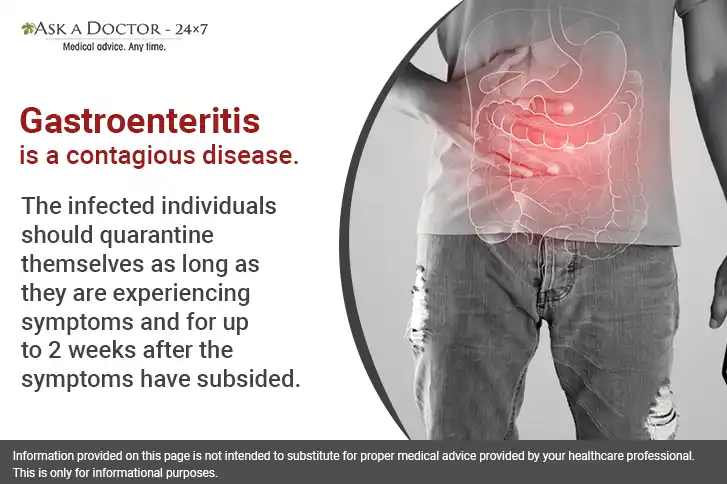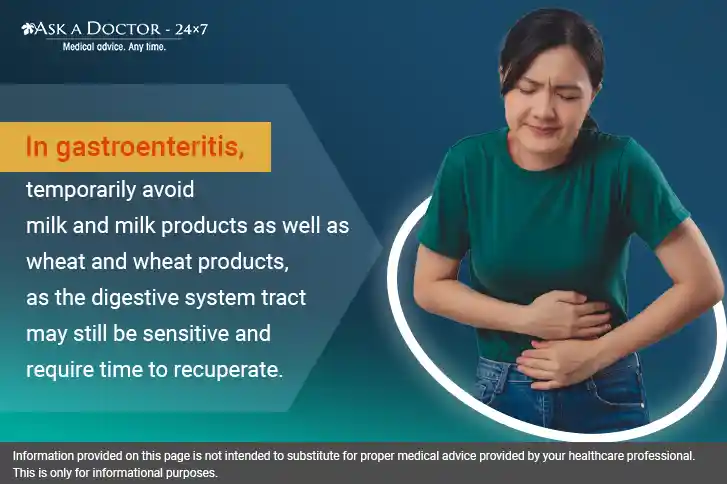Difference Between Viral And Bacterial Gastroenteritis
Gastroenteritis or stomach flu is the diarrheal infection and inflammation of the digestive system involving your stomach and intestines. Gastroenteritis might be either viral or bacterial in origin, depending on the cause.
Here in this blog, our expert has jotted down some common symptoms and a few things to help understand the difference between the two types - viral and bacterial gastroenteritis. Also, she has explained some tips to prevent the causes. Let's read in detail...
Common Symptoms of Gastroenteritis

The symptoms of gastroenteritis show similarity in both cases and therefore, it becomes challenging to determine the underlying cause of gastroenteritis.
Some of the most common symptoms of gastroenteritis whether caused by bacteria or viruses include:
- Watery diarrhea
- Vomiting
- Abdominal pain or cramps
- Fever (sometimes)
- Loss of appetite
- Dry mouth or dry skin due to dehydration
However, it is critical to understand the difference between viral and bacterial gastroenteritis to administer the proper care.
Decoding the Difference between Viral and Bacterial Gastroenteritis
Differences between viral gastroenteritis and bacterial gastroenteritis are:
1) Based on the Cause:
- Bacterial gastroenteritis is caused by bacterial species like Shigella, Salmonella, Campylobacter, and E. Coli
- Viral gastroenteritis is caused by a virus, such as a Rotavirus or Norovirus
2) Time of Illness:
- Bacterial gastroenteritis can persist for up to a week or longer.
- Viral gastroenteritis normally lasts 1 to 3 days.
3) Spread of infection:
- Viral gastroenteritis is extremely contagious and may be transferred through contact with infected feces and contaminated items.
- Bacterial gastroenteritis is mostly disseminated by contact with contaminated food or drink.
4) Symptoms-wise:
- Viral gastroenteritis typically manifests more rapidly than bacterial gastroenteritis. The usual symptoms of viral gastroenteritis are nausea, vomiting, watery diarrhea, and abdominal cramps.
- Bacterial gastroenteritis can showcase similar symptoms but are accompanied by fever, chills, and bloody diarrhea.
5) Treatment-wise:
- Viral gastroenteritis has no particular treatment, patients recover on their own without medical intervention.
- Bacterial gastroenteritis treatment involves antibiotics.
In both cases, you may need additional treatment to replace the lost fluids and electrolytes in your body, based on the severity of your illness. In some cases of severe dehydration, you may need IV fluid replacement. One should use oral rehydration salts (ORS) to prevent the harmful effects of diarrheal dehydration.
How To Prevent Gastroenteritis?

Prevention is the key and handwashing is the solution for gastroenteritis:
- Practice good personal hygiene and cleanliness of surroundings.
- Wash your hands before handling or preparing food.
- When serving food, don't keep it out too long. If there's any chance of food going bad, throw it out.
- Wash your vegetables thoroughly before consuming them.
- Don’t eat undercooked food.
- Wash your laundry thoroughly.
- Use alcohol-based hand sanitizers.
Thus, gastroenteritis is a digestive problem caused by bacteria or viruses. Symptoms include nausea, vomiting, fever, diarrhea, abdominal cramping, and pain. In severe cases, you may become dehydrated and may have an electrolyte imbalance. Good hygiene is the best way to prevent gastroenteritis. Allowing your body to rest, staying hydrated, and consulting a specialist is the key to getting a quick healthy recovery from gastroenteritis. If you or someone you know has symptoms of gastroenteritis, you should see a doctor to ensure the proper diagnosis and treatment plan are given.
If you have any questions related to gastroenteritis, you can check with our Gastroenterologist at Ask a doctor, 24x7.
Recently Answered Questions Related to Diarrhea and Gastroenteritis
Ask a Specialist
Recent Questions


